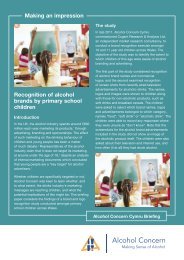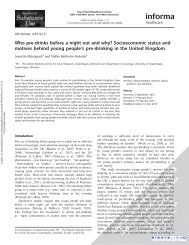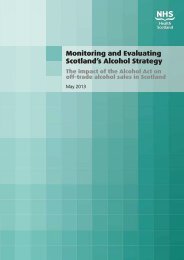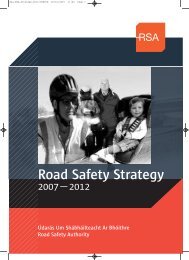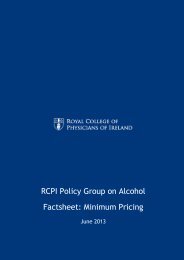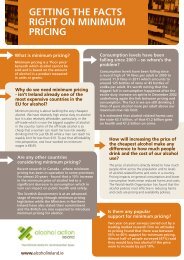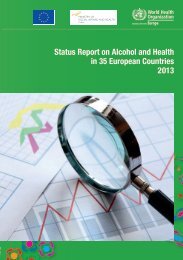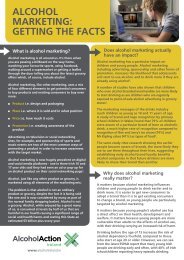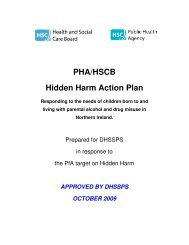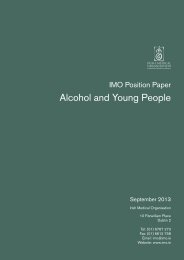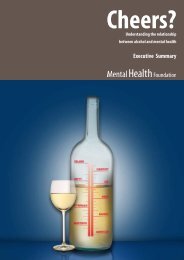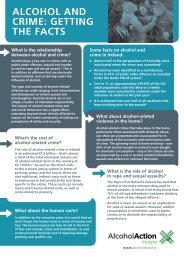Addressing the harmful use of alcohol - WHO Western Pacific Region
Addressing the harmful use of alcohol - WHO Western Pacific Region
Addressing the harmful use of alcohol - WHO Western Pacific Region
You also want an ePaper? Increase the reach of your titles
YUMPU automatically turns print PDFs into web optimized ePapers that Google loves.
<strong>Addressing</strong> <strong>the</strong> <strong>harmful</strong> <strong>use</strong> <strong>of</strong> <strong>alcohol</strong> : A guide to developing effective <strong>alcohol</strong> legislation<br />
Restricting <strong>the</strong> hours and days when <strong>alcohol</strong> may be sold has historically also been a key<br />
mechanism in <strong>alcohol</strong> control legislation, with <strong>of</strong>fences incurring heavy fines.<br />
Decision-making authority<br />
In establishing a licensing system, <strong>the</strong>re are important considerations related to institutional<br />
location <strong>of</strong> decision-making powers. There are pros and cons in locating decision-making<br />
at <strong>the</strong> local level, where licensed premises can be more easily monitored, or at a national<br />
level, where decisions cannot to be influenced by close personal relationships and small town<br />
politics. The best solution is probably one that suits <strong>the</strong> scale <strong>of</strong> <strong>the</strong> country and its <strong>alcohol</strong><br />
market, ra<strong>the</strong>r than one ‘best model’ from ano<strong>the</strong>r country.<br />
The Australian states each have <strong>the</strong>ir own legislation, with a licensing authority and appeal<br />
body in each state. In New Zealand, changes to a bill in Parliament resulted in a two-tier<br />
system, with initial processing and monitoring at <strong>the</strong> local level and any contested decision<br />
referred on to a national-level authority, which holds hearings around <strong>the</strong> country. In England<br />
and Wales, licensing is decided by local committees <strong>of</strong> Justices <strong>of</strong> <strong>the</strong> Peace and in Scotland<br />
by committees <strong>of</strong> local government. In both countries, <strong>the</strong>re are growing discrepancies in <strong>the</strong><br />
application <strong>of</strong> <strong>the</strong> legislation and local policies, with no specialist national agency responsible<br />
for maintaining an overview.<br />
If <strong>the</strong> licensing authority is an appointed body, consideration should be given to its membership:<br />
number <strong>of</strong> members; term <strong>of</strong> <strong>of</strong>fice; whe<strong>the</strong>r juridical or public health expertise is required;<br />
and avoiding conflicts <strong>of</strong> interest from any involvement in <strong>alcohol</strong>-related businesses.<br />
There is variation between countries on whe<strong>the</strong>r <strong>the</strong> licensing authority is a quasi-judicial<br />
body or an administrative body under a director with powers <strong>of</strong> enforcement and also powers<br />
to inquiry into any matters relevant to <strong>the</strong> Act. This decision will also affect how much<br />
discretionary power <strong>the</strong> decision-making body is to have. Devolution <strong>of</strong> decision-making to<br />
<strong>the</strong> local level may result in discrepancies among districts. This problem can be avoided if<br />
legislation is written with narrow criteria and little room for flexibility. But this may lead to<br />
dissatisfaction if decision-makers are prevented from reasonably resolving problems. Most<br />
jurisdictions allow <strong>the</strong>ir licensing authority some discretion to set additional licence conditions.<br />
Under New Zealand’s legislation, written with full devolution in mind, <strong>the</strong> national licensing<br />
authority handles contested applications, but finds itself unable to respond to community<br />
concerns. There are now proposals to include <strong>alcohol</strong> policies adopted by local councils in <strong>the</strong><br />
legislation’s criteria for granting licences.<br />
40 Return to TOC



